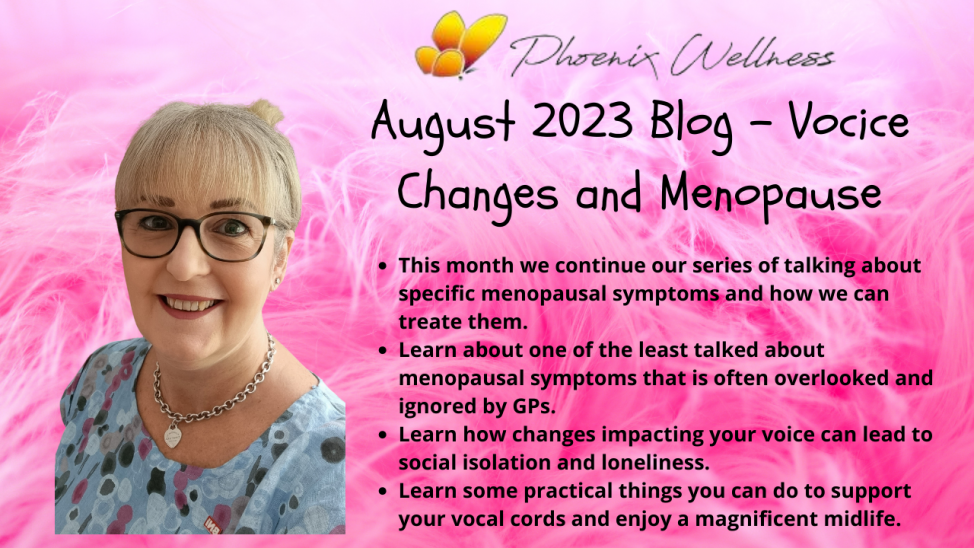
Welcome to this month’s blog. I am excited to be exploring an often-unknown symptom of menopause – the impact that fluctuating hormones can have on our voice. This is most definitely the hidden and overlooked symptom, but it does affect many women but often unless they are singers, actors, or public speakers, goes largely undiagnosed and ignored.
I am sure you’ve had conversations with your girlfriends about your menopause symptoms, and I would bet these were focused on hot flushes, night sweats, loss of libido, aching joints, or changes to your hair, nails, and skin. But I would also guess you’ve never talked about changes in your voice as you wouldn’t have thought that was linked to menopause. And yet, I know that as I went through perimenopause, I started to notice that I suffered much more with soar dry throats, I felt I was constantly coughing like I had a frog in my throat and was much more susceptible to throat infections and particularly laryngitis. I know when I become stressed and overwhelmed at work, I would come down with a throat infection and often lost my voice. Whilst my silence was great for my husband and family, it was a real problem for me as I often had to talk as part of my role – in my corporate job I was always in meetings so making myself heard was hard, not to mention painful, or I would be giving presentations made all the more nerve racking because I was worried my voice would crack part way through and I wouldn’t get to the end. I just thought I was rundown and needed to give my immune system a boost so turned to vitamins and supplements to help, along with drinking even more water but none of these things made a difference. My throat kept on suffering, and I didn’t understand why.
What’s the science behind voice issues at menopause?
A change in voice and a hoarse voice can occur as part of perimenopause. An increasing number of women aged 40-60 complain about vocal problems, but few realise how their issues are related to menopause and hormones. That frequent clearing of your throat, cough, and vocal changes are because of changes in your larynx, including mucus on your vocal cords, due to hormonal imbalances.
Your larynx is a very busy organ. It directs air into the lungs to breathe, and food into the oesophagus on its way to the stomach. The larynx is responsible for creating the sound of your voice. Within the larynx are your vocal cords that open to allow breathing and vibrate when you talk to give you sound.
Your voice is very sensitive to hormonal changes particularly at perimenopause and beyond. Even small changes in your hormone levels can have an impact on your voice, changing the pitch and intensity. Think about an older person’s voice – it’s often quieter, and more frail sounding. Also think about the differences when you compare a younger person’s voice – it’s often louder, stronger, has more pitch and can be higher. The changes in your hormones at menopause can have the same effect on your voice as that of puberty on a boy’s – it will crack and often drop in pitch and tone.
Your vocal cords and larynx are hugely impacted by your hormones – it’s a “hormonal target” or “hormonal barometer” if you like. The tone of your voice depends on the levels of oestrogen, progesterone, and testosterone. As these fluctuate and reduce at menopause, your voice can change too. Some women may have more severe vocal changes than others, but many are ignored or dismissed by GPs. If you need to use your voice for your business, then this symptom can have a big impact on how you feel about yourself and your abilities.
What’s the science behind voice issues atWhy is the voice so impacted by our hormones?

Basically, the vocal cords and larynx are made up of connective tissue, muscle, and cartilage. All these tissues need hydration and collogen to remain lubricated. Without hydration, these tissues become dry, flaky, and less flexible which impacts the way they function resulting in you sounding hoarse, coughing, and having that constant feeling of needing to clear your throat. Oestrogen is particularly important in lubricating the cells in your body and carries collogen to your cells and tissues, so when this hormone starts reducing in your system it can have a huge impact on those tissues.
In a recent study, postmenopausal women were asked about vocal changes and discomfort:
- 46% mentioned general vocal changes
- 30% said they experienced discomfort
The main changes the women mentioned included a dry throat, voice discomfort and fatigue, frequent throat clearing, lower voice frequency and increased roughness or hoarseness.
You need to also be mindful that other medical conditions or medications can have an impact on your voice, such as hyperthyroidism, chronic infections, cancer, or the prolonged use of corticosteroids. Remember to always discuss any changes with your GP to rule out underlying illness or other medical conditions.
Why do these changes matter?
You may not think these changes would matter especially as around 54% of respondents in the above survey reported no noticeable changes. There could be a couple of reasons for this statistic – they genuinely didn’t notice any changes which impacted their life, or like me, they put changes down to other lifestyle factors. But that said, if you suffer with these changes the impacts can be big:
- Loss of self-esteem – how you view yourself and your place in the world can change considerably through your perimenopause journey and if you find that you cannot talk like you used to or are worried that when you stand up to give that presentation that you’ll lose your voice or start coughing, then you’re perception of how you compare to others may be lower.
- Loss of confidence – menopause can already cause you to feel less confident than you used to, and if you are worried about how you might come across to others because your voice is different or less reliable then that will make you question your abilities.
- Stress – if you rely on your voice to help you relax i.e., if you are in a choir or sing in your spare time, then these changes will impact your singing voice. You may find you can’t reach and hold the notes you used to, plus your larynx is instrumental in how you breathe, and if the cartilage that makes up your larynx starts to dry and harden then you may find you can’t breathe as well as you used to – a vital skill if you’re a singer!
- Social isolation – if your voice isn’t as strong as it used to be and you may find you struggle to make yourself heard in noisy situations, you could find you start to dip out of social events because you’re worried about whether you’ll be able to make yourself heard over other noise. As a result, you may say no to nights out with friends which can lead to social isolation, loneliness and depression.
- Inability to communicate – again if your voice is feeling harsh, uncomfortable, or fatigued then communicating with those around you might become more difficult. Also, if you find you need to clear your throat or worry about coughing then you may not talk as much and so your thoughts and needs may not be met as you aren’t communicating fully.
Why do these changeWhat can we do to relieve these impacts?

You can’t turn back time and not experience menopause, which is a normal process in your life, whether that happens naturally in your early 50s or younger due to other medical or surgical conditions. There are things you can do that will help if you start to notice these changes and want to look after your vocal cords and larynx:
- Hormone Replacement Therapy – this is an obvious one. The changes you may experience are the result of fluctuations and changes in your hormone levels, so if you are able to even those fluctuations you may be helping your voice as well as many other symptoms.
- Stay hydrated – drinking water regularly and increasing your intake of water will help you to stay hydrated which helps the tissues and cells in your vocal cords to stay more lubricated.
- Stop smoking – you know that smoking is bad for your health in numerous ways, but it also dries your throat more, causes congestion in your lungs which leads to more coughing. It can even exacerbate the incidence of hoarseness too.
- Breath work – there is a lot of research suggesting that breath work can help your vocal cords. Learning how to breathe properly – engaging the diaphragm – can have a positive impact on your vocal cords which play an important role in directing oxygen to your lungs. Plus, breath work can have many other benefits on menopausal symptoms such as reducing stress and anxiety, improving sleeplessness and cognitive function, and can lessen hot flushes.
- Decrease stress levels – the primary stress hormone cortisol, can have a negative effect on your vocal cords. As cortisol levels increase in your system it causes your voice to become hoarser, together with taking shorter quicker breaths.
For more support and information
If you are experiencing perimenopausal symptoms or think you may be then please reach out to me at jeanette@phoenixwellness.co.uk and we can explore how our programmes might support you better. You may want to take a look at some of our other blogs exploring some of the more common symptoms of menopause and how to manage those at www.phoenixwellness.co.uk Alternatively we have many webinars available via our monthly membership Phoenix Wellbeing Café that can support your wellbeing in the broadest sense.

